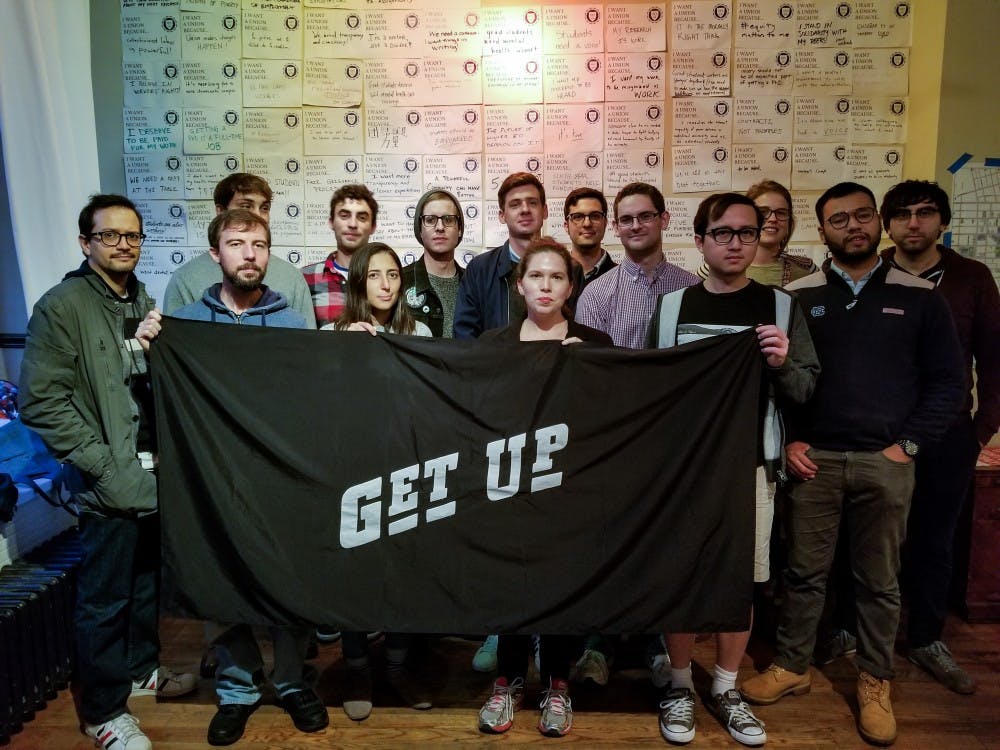More than five months have passed since graduate students at Penn petitioned the Philadelphia’s National Labor Relations Board to hold a formal union recognition election, but the process has yet to move forward. These delays were made clear in light of the recent unionization of graduate students at the University of Chicago, who launched their petition just weeks before Penn did.
On May 30, the pro-union group called Graduate Employees Together - University of Pennsylvania, filed a petition with the regional NLRB to facilitate an election determining if Penn's graduate and professional students could form a union.
According to NLRB’s website, 98.5 percent of elections in fiscal year 2017 occurred within 56 days of a petition's submission. The median number of days for a contested case from a petition's submission to an election is 36 days. However, as of Nov. 19, GET-UP’s petition has gone unanswered for 173 days.
“We’ve been waiting for three times longer than normal.” GET-UP member and Graduate School of Education Ph.D. student Miranda Weinberg said.

File Photo
University spokesperson Stephen MacCarthy said in an email that the University had no comment on the delays.
To form a labor union, an interested group must present the regional NLRB with signatures from 30 percent of those who they think the union will protect. The NLRB then facilitates a simple majority vote to decide on whether the union can be established. Details of the proposed union can be contested, delaying the process.
After GET-UP submitted its petition in May, the University challenged the petition, resulting in three weeks of hearings starting in mid-June. Penn questioned the composition of the group of students that GET-UP wants to represent, Weinberg said.
RELATED:
Graduate students wanted to vote on their labor union months ago. Here’s why they haven’t.
Graduate students still face a series of obstacles in their fight to establish a labor union
Grad student unionization efforts have been gaining steam, but this organization isn't on board
She added that the filing of post-hearing briefs, which summarize the arguments made in the hearings, delayed the process for an additional two weeks.
Even accounting for this initial five-week delay, the Philadelphia NLRB has taken months longer to issue a decision than other offices legislating similar petitions. David Rose, a field attorney with the Philadelphia NLRB, said he is not currently authorized to make a statement about GET-UP's ongoing petition.
Since August 2016, when the NLRB overturned a previous decision that disallowed graduate students to unionize, graduate student groups at other private universities like Harvard University and Yale University have taken steps to unionize.
A graduate student group of the University of Chicago, Graduate Students United, submitted a petition to unionize to Chicago’s NLRB office on May 8, just three weeks before GET-UP filed their petition. UChicago challenged GSU’s petition in a similar set of hearings taking place from mid-May to early June.
However, the NLRB Chicago regional representatives issued an election order on Aug. 8, 92 days after GSU submitted their petition. And on Oct. 18, after a two-day election, the group formally voted to unionize with an overwhelming majority of 1,103 to 479.
Ian Heinrich, a pharmacology Ph.D. student, who is a member of No Penn Union, a group that opposes GET-UP becoming a centralized union, said he thinks Penn's five-month wait time is unusual.
“Based on other school's NLRB hearings, we expected a decision to come out in September,” he said in an email.
However, Penn Law School professor and Deputy Dean Sophia Lee wrote in an email that she doesn’t believe “there’s a number of days within which a decision must be rendered.”
Fellow GET-UP member and political science Ph.D. student Danielle Hanley speculated that the lengthy delay could be due to regional differences in processing petitions.
Both Weinberg and Hanley said they are concerned that President Donald Trump’s new conservative appointees to the NLRB could indefinitely obstruct GET-UP's unionization process.
Weinberg added that even though a poll conducted by The Daily Pennsylvanian in 2003 indicated that 60.4 percent of eligible voters surveyed supported a graduate student union, a similar conservative shift at the national level partly kept the group from unionizing in 2004.
Weinberg said there is currently no way for GET-UP to expedite the process or to have an idea of when the Philadelphia NLRB will issue a decision on their petition.
“It’s a black box. We really can’t know [whether there are reasons for the delay]," Weinberg said. "Until they give us an election order, we don’t know what happens.”



